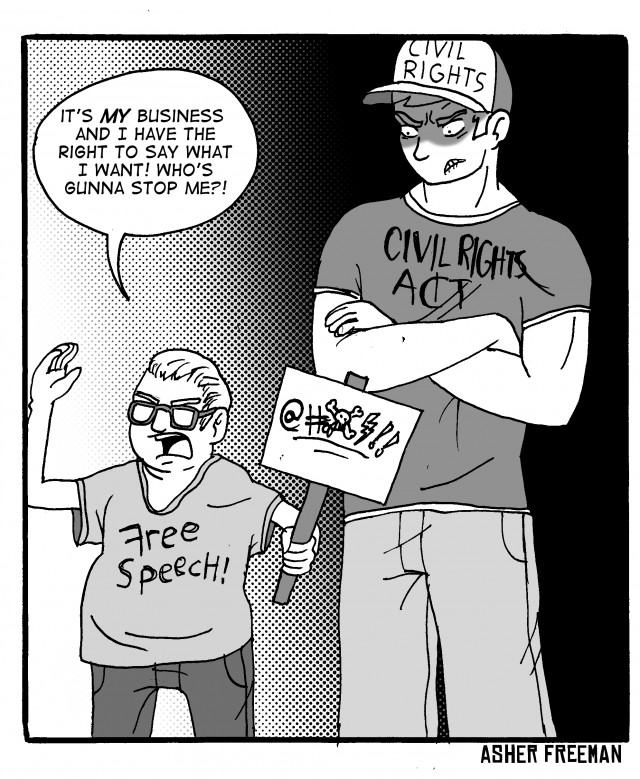Discrimination is far from eradicated from our society, and it seems like each newsworthy incident is a reminder of just how much more work our society has yet to do.
Gary James, a restaurant owner in Enid, Okla., serves as a painful example of a person that refuses to treat others with respect.
James is the owner of Gary’s Chicaros, and he refuses to serve homosexuals, disabled people and “freaks,” and James flaunts his bigotry proudly. In fact, his restaurant has shirts that demean Muslims, African-Americans and Democrats, among other groups.
“If you work, you own a business, you pay their taxes, you’re more than welcome in here,” James told NBC’s KFOR. “If you’re on welfare, stay at home. Spend my money there.”
News of this restaurant hit the public eye when Matt Gard was refused a meal at Gary’s Chicaros. Gard is handicapped and claims that he was refused service because of his disability.
James, however, claims that Gard and his company were loud, and it was the noise that got them permanently banned from his restaurant.
Oklahoma law protects people from being turned away because of their race, disability, gender or religion, and the restaurant needs to be legally forced to stop discriminating.
The issue is somewhat complicated, however, because Oklahoma law doesn’t protect homosexuals from discrimination like it should.
Title II of the The Civil Rights Act of 1964 outlawed discrimination in businesses such as a “restaurant, cafeteria, lunchroom, lunch counter, soda fountain or other facility principally engaged in selling food for consumption on the premises, including, but not limited to, any such facility located on the premises of any retail establishment; or any gasoline station.”
In light of these laws, James’ business practices are illegal and he should be forced to stop discriminating against his potential customers.
James’ sympathizers argue that, as a private business owner, he should be able to refuse business to anyone that he does not want to serve.
The problem with this is the aforementioned Civil Rights Act.
Claiming that James has the right to refuse service to groups of customers is akin to one child hitting another and then claiming that it was fair because “it’s a free country.”
As a business owner, James has rights. The right to discriminate is not one of them.
And yes, the Civil Rights Act applies to private business as well as public ones.
In a perfect world, if a person opened a restaurant with business practices like this, the people would be disgusted and boycott the business until it was forced to close its doors for good.
James has been in business for 44 years and appears to have the support of the town of Enid, Okla. The town has allowed this sort of business practice and this speaks to the extent of discrimination that exists today.
If this issue doesn’t seem important to you, just remember the words of Martin Niemoller, an anti-Nazi theologian that wrote, “First they came for the socialists, and I did not speak out — Because I was not a socialist. Then they came for the trade unionists, and I did not speak out — Because I was not a trade unionist. Then they came for the Jews, and I did not speak out — Because I was not a Jew. Then they came for me — and there was no one left to speak for me.”
If you feel as though a business has unfairly discriminated against you, contact your state’s attorney general.
You could make a difference and help prevent someone else’s pain and keep people like James from unfairly discriminating against innocent people.





